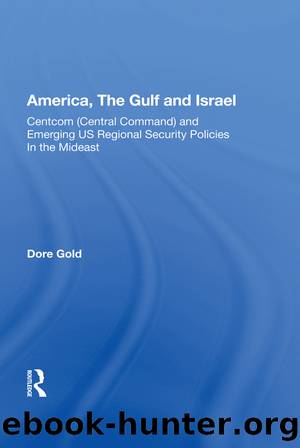America, the Gulf and Israel: Centcom (Central Command) and Emerging Us Regional Security Policies in the Mideast by Dare Gold

Author:Dare Gold [Gold, Dare]
Language: eng
Format: epub
Tags: Middle Eastern, Social Science, Political Science, World, Regional Studies
ISBN: 9780367152994
Google: HimNDwAAQBAJ
Goodreads: 48633448
Publisher: Routledge
Published: 2020-11-09T00:00:00+00:00
The Tanker War Round Two- Cautious USGCC Cooperation Against Regional Threats
During 1985 the continuing tanker attacks in the Persian Gulf were still an insufficient cause for any fundamental change in the US-GCC security relationship. The total number of Iranian attacks against tankers serving Gulf Arab ports for the entire year reached only 11; in comparison, 16 tankers had been struck by the Iranians in 1984 in the period from May to December alone.31 Concern was instead focused on two other developments connected with the Iran-Iraq War. First, Iranian troop concentrations during the year, and the March 1985 Iranian assault in the Huwaiza marshes, threatened to cut off southern Iraq and its principal city, Basra, from Baghdad to the north. While the Iranian offensive was repulsed in an Iraqi counterattack, the GCC states- and above all Kuwait - had to address the prospect of a new revolutionary Islamic republic emerging in southern Iraq adjacent to their northern border.
Secondly, Kuwait particularly was confronted with an intensification of the frequency and lethality of terrorist attacks. These, by virtue of their connection to Kuwaitâs foreign Shiâite communities, appeared to have had Iranian organizational direction or at least inspiration. Among the targets of these attempted pro-Iranian attacks were the editor of one of Kuwaitâs most noted newspapers, al-Siyasa; seaside resort cafes frequented by the shaykdomâs internal security personnel; and, above all, Kuwaitâs ruler, Shaykh Jabir al-Sabah. In this environment of a feared Iraqi collapse and increased internal subversion, there was little the United States could do for its Gulf partners. Reportedly during the year Secretary of State George Shultz secretly pledged US aid in the defense of the territorial integrity of the GCC states in the event that they made a public request and offered military facilities.32 As was the case with the 1984 Murphy-Poindexter mission, neither of these preconditions was met in 1985. Nevertheless, Washington appeared to have recognized not only the need to make preparations in response to the tanker war, but also the prospect of a future expanded land war encompassing its Gulf partners as well.
Events in 1986 pushed Kuwait far ahead of its GCC neighbors in seeking a more activist approach from the United States in the Gulf region. At the start of the year, Iran seemed again about to break the stalemate in the ground war with its successful offensive into the Faw Peninsula at the southern tip of Iraq. Pressure immediately built up on Kuwait over whether it had- or would soon -let the Iraqis use its strategically located islands of Bubiyan and War bah directly across from Iranian-held Faw. Iranian suspicions of Kuwait and other Gulf states during the year were further intensified after the Iraqi Air Force successfully conducted long-range bombing attacks against Iranâs remote Sirri and Larak island oil terminals in the lower Gulf. GCC collaboration in providing ground facilities to the Iraqi aircraft seemed to the Iranians to be far more likely than an Iraqi mid-air refueling capability.
In the tanker war itself, newly deployed Iranian equipment and altered tactics promised now to threaten all shipping serving Gulf Arab ports.
Download
This site does not store any files on its server. We only index and link to content provided by other sites. Please contact the content providers to delete copyright contents if any and email us, we'll remove relevant links or contents immediately.
| Automotive | Engineering |
| Transportation |
Machine Learning at Scale with H2O by Gregory Keys | David Whiting(4312)
Never by Ken Follett(3954)
Urban Outlaw by Magnus Walker(3395)
OPNsense Beginner to Professional by Julio Cesar Bueno de Camargo(3288)
Sapiens and Homo Deus by Yuval Noah Harari(3071)
Will by Will Smith(2919)
A Short History of Nearly Everything by Bryson Bill(2698)
Hooked: A Dark, Contemporary Romance (Never After Series) by Emily McIntire(2553)
Rationality by Steven Pinker(2363)
Borders by unknow(2313)
The Becoming by Nora Roberts(2201)
Holy Bible (NIV) by Zondervan(2125)
A Short History of War by Jeremy Black(1848)
HBR's 10 Must Reads 2022 by Harvard Business Review(1841)
The One Percenter Encyclopedia by Bill Hayes(1826)
Freedom by Sonny Barger(1798)
Go Tell the Bees That I Am Gone by Diana Gabaldon(1756)
A Game of Thrones (The Illustrated Edition) by George R. R. Martin(1744)
Five Ways to Fall by K.A. Tucker(1741)
